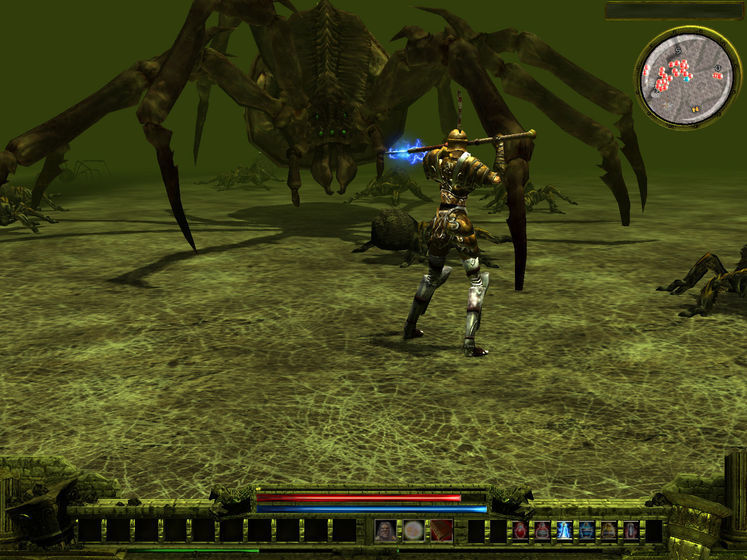A wise man once said it’s better to do something well than to do something new. It seems Cyanide is familiar with this philosophy, as the leading artist on the project recently (and kind of unexpectedly) acknowledged the developer’s inspiration very openly. Apparently, he and his colleagues were tired of waiting for Diablo 3, and decided to make it for themselves. Most will agree that’s precisely what they’ve done, and done well.
The storyline of Loki is perfectly in keeping with requirements. Not dripping in intricate detail – just enough to provide a reason to fill the screen with all manner of mythological nasties and give players something big and savage to slay without feeling unnecessarily homicidal. Seth (the Egyptian God of the desert and, historically speaking at least, leader of the Egyptian pantheon) provides the megalomaniacal counterpoint to Loki, since all the good gods have been taken in the recent onslaught of mythological mayhem games, and is running amok in heaven.
His naughty divine antics have spread throughout the Norse, Egyptian, Greek and, peculiarly, the Aztec heavenly dominions. It’s not massively important, and Cyanide’s done a good job plundering the disused religious iconography of these races to provide a diverse and recognisable enemy base for us to massacre, though the Aztec kingdom is slightly tenuous when it comes to providing sword fodder (if I’d been invited to early developmental meetings at Cyanide, I would have suggested the Roman mythology instead. But I wasn’t invited). An eclectic mix of random demons and god-like... things with curvy, impractical weaponry and animal-esque heads are fine, but seeing Cortez thrown in there for some shaky historical link was a bit daft. He was just a bloke, after all, and Loki would cleave him in twain without a second thought if they actually met on the celestial battlefield. I realise this doesn’t make much difference to the enjoyable hack ’n’ slash gameplay, but for a mildly inexplicable reason, it did allow incredulity to slip through the net and ruin that particular level.
The controls are simple and effective, and anyone who’s ever played Diablo (or, for that matter, any other mildly respected addition to the genre) will have no trouble whatsoever with the “left to kill”, “right to magic” mouse button controls of Loki. The point of view is dynamic and accessible, allowing players to look around and adjust their vision during the heat of battle without any difficulty. The main character’s pockets are unexpectedly deep, so amassing a wealth of gold coins, potions and other standard, ground dwelling fare of the exploration game is easy and prolific. The majority of provisions not used in the throng-on warfare can be swapped for goodies and weaponry at the local arms shop (conveniently located at a teleporter near you) – all standard, necessary stuff that doesn’t intrude on the fighting based gameplay. That said, the simplicity and, to be frank, dumbing down of the system might leave more experienced players feeling like they’re splashing around in the shallow end of the RPG pool.
Some nice features, such as the ability to break weapons down into components and fashion your own razor-edge bludgeon of ridiculous proportions is nice, and a well designed implement does have a genuine effect on battles. While the other game devices (spells and so forth) have a rating system and can be expanded to suit, the actual difference to the fast and furious slaughter of the main gameplay is almost unnoticeable and simply serves to eat up cash that could have been better spent on a bigger sword. The skill tree allows various powers from the realm gods to be bestowed upon Loki, expanding his natural abilities and providing bigger and flashier effects for wiping out a screen full of beasties. This system feels a little like an afterthought, however, and personally I put my efforts into murder and mayhem rather than continually redesigning the Loki character.
Acquiring patronage from the likes of Sony and/or Microsoft is no small or inexpensive task, so it’s easy to see why Cyonide opted for the PC route. But “easy” doesn’t always cut the mustard, and the nagging feeling of impropriety that pervades Loki is inevitably realised. This simply isn’t a PC game. Were it given an extra sheen of gloss, it’d make a very decent home console game that many a casual gamer would find a regular window in their schedule for. But PC gamers are generally a different breed, looking for at least some form of immersion and expansion possibilities in their extended play time. Loki provides none of this, and the limited mouse based attacks quickly become an unsatisfying button mashing practice.
 |
| While the characters are well detailed, some of the environments (particularly the sky) are woefully sparse |
The extra control available over the camera is nice, but could easily have been compensated for by a game controlled POV on a console, while the extra buttons and couch based comfort would have placed Loki in a far more suitable setting. Cyanide aren’t asking too much for their hack ‘n’ slash RPG, so it’s not like gamers will expect a particularly engrossing epic. What they get is what they expect; a bright and brash fighting game that keeps to the established expectations, but would have been far better suited to the repetitious, unpretentious and simplistic nature of a home console.
Top Game Moment:
TOP GAME MOMENT
Redesigning your melee arsenal is not something often seen, and coming up with some ridiculous, sharp and pointy implement of death – then putting it to full use – is a great way to pass a few minutes.








